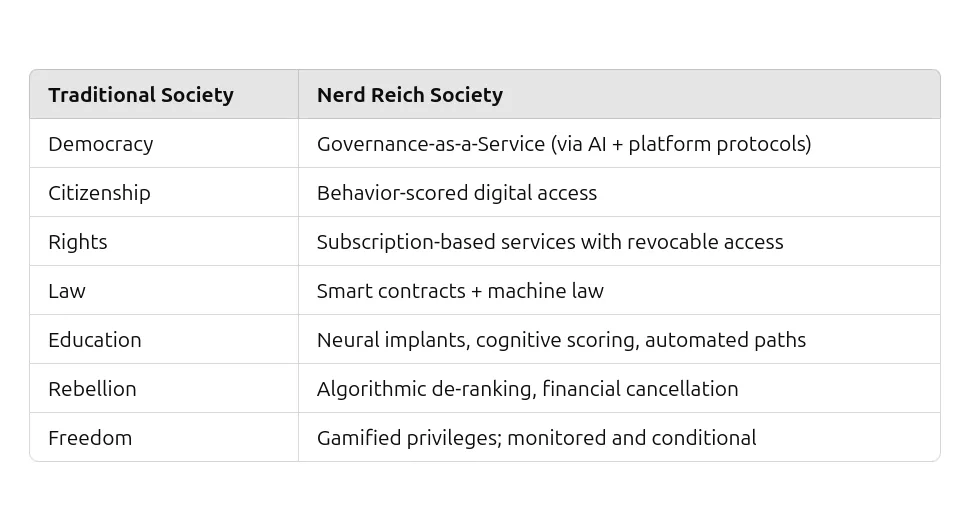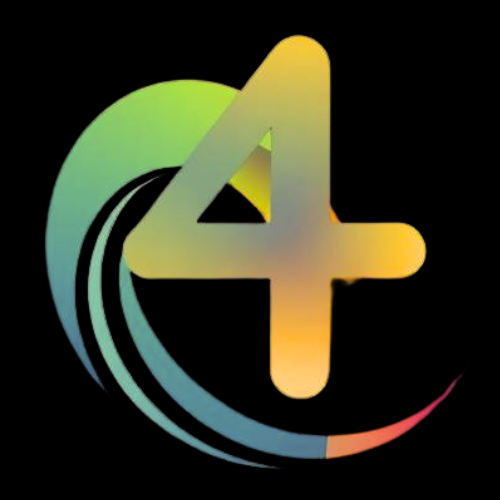Swapping the Present with the Future: The Rise of the Nerd Reich
By:
Radu Timis
On
22/03/2025Reading time:
0 min
Summary:
⚠️ Warning: The following article may challenge your assumptions about technology, freedom, and the invisible future already underway, or not! Treat it as a pamphlet in progress!
I. The Empire You Didn’t Notice Installing
In the grand arc of human civilization, empires used to arrive with banners, bullets, and blood. But what if the next empire comes without conquest, without fanfare — quietly uploading itself into our daily lives through every convenience we welcome?
This isn’t speculative fiction. This is a phenomenon already under way — what some thinkers have provocatively begun to call the Nerd Reich.
It’s not a government in the traditional sense. It has no borders, no president, no national anthem. It’s something else entirely: a technocratic regime governed by coders, machine learning models, and corporate protocols. Its control doesn’t come through laws, but through code. It doesn't legislate — it updates.
The Nerd Reich isn’t knocking.
It’s already connected to your Wi-Fi.

A futuristic enclosed chamber where digital elites oversee a population synchronized under algorithmic rule.
II. The Blueprint: Problem – Reaction – Solution
The rise of the Nerd Reich is not spontaneous — it's algorithmically orchestrated. At its foundation lies a powerful socio-political mechanism long explored by critics of mass manipulation: Problem – Reaction – Solution.
This triad, popularized by David Icke and rooted in Hegelian dialectic, unfolds as follows:
Problem – A crisis (real or fabricated) emerges: a virus, a cyberattack, a climate emergency.
Reaction – Public panic ensues, amplified by emotion and media distortion.
Solution – A prepackaged answer arrives, typically technological, invasive, and irreversible.
The genius of this mechanism is that the people demand the very chains they will later regret.
From pandemics to cyberattacks, from economic collapses to "AI threats," every crisis becomes a gateway drug to technocratic intervention. We aren’t asked to vote on these new structures. We’re simply told they’re necessary — for safety, for efficiency, for "the greater good."
III. Rise of the Code-Lords: When Engineers Become Emperors
The Nerd Reich is not ruled by kings or politicians. It is ruled by a new aristocracy: engineers, futurists, venture capitalists, AI ethicists, platform architects.
Their weapons?
Algorithms that shape opinion and filter reality.
Predictive models that preemptively punish.
Smart contracts that automate compliance.
Terms of Service that silently rewrite our rights.
The irony is that we empowered them. We liked, subscribed, downloaded, and "swiped" this world into existence.
In the Nerd Reich, data is territory, connectivity is citizenship, and obedience is automated.
IV. The Philosophers of the Future Past
To understand how we got here, we must rewind to the thinkers who saw this coming:
Curtis Yarvin (a.k.a. Mencius Moldbug) – The Patchwork Prophet
Yarvin proposed a future in which democratic governments would collapse and be replaced by corporate-run city-states, each ruled by a CEO-like figure. Citizens would be clients, rights would be services, and leadership would be proprietary software.
Yuval Noah Harari – The Historian of Homo Algorithmus
Harari warned of a world where humans become "hackable animals." The elites who own the data will own the future. Democracy, he argues, cannot compete with algorithmic efficiency.
Nick Land & the Accelerationists
Why slow down? For Land, the collapse of modernity is inevitable — and necessary. The faster we race toward the singularity, the sooner we birth a new order. The Nerd Reich is that order: efficient, brutal, logical.
V. Anatomy of the Nerd Reich
Let’s break it down.

Nerd Reich Society
In this new system, there are no elections. Just updates.
VI. The Algorithmic Gulag
And what of those who resist?
What happens to the “non-compliant,” the “obsolete,” the ones who won’t upgrade?
Curtis Yarvin once joked about using surplus population as “biodiesel,” or locking them in digital prisons. It was satire — until it wasn’t. The infrastructure for virtual containment already exists: metaverse work camps, digital credit scores, un-personing by algorithm.
Those who refuse to conform may not be jailed — they may simply be disconnected.
No access to funds. No platform. No voice.
In a fully digitized world, to be offline is to be exiled.
VII. Simulated Liberties and Real Dependencies
The most brilliant part? The Nerd Reich doesn’t need oppression. It offers you everything — as long as you accept the interface.
Want love? There’s an app for that.
Need therapy? AI has better answers.
Want to protest? Here’s a virtual plaza. Just… don’t break the algorithm.
Freedom is now a licensed experience, calibrated for your psychological profile, integrated with your wearable, and monitored by your sentiment score.
VIII. We Didn’t Vote for This
The Nerd Reich was never elected.
It was installed — like a mandatory firmware update for society.
And now, as the lines blur between human and machine, between citizen and user, between free choice and pre-scripted reaction, we face a closing window:
Will we demand transparency before the black box becomes law?
Will we reclaim governance before governance is just a feature?
Or will we submit — one swipe at a time?
Final Thought
In this world, your freedoms will be:
Streamlined,
Optimized,
Monetized,
And, if necessary, revoked.
Welcome to the Nerd Reich — an empire of pure logic and zero empathy.
And remember:
The next totalitarian regime won’t burn books. It will rewrite the algorithm.
Subscribe to our newsletter!
Stay in touch and be the first to be informed with the latest news!

AI Agents: Revolutionizing Industries or Overhyped Hype? A Balanced Look at the Future
Miha Ella
15.02.2025
Artificial Intelligence (AI) is no longer a futuristic concept—it’s already here, reshaping industries, workflows, and even daily life. From automating customer service to optimizing supply chains, AI agents are being heralded as the next big revolution. But is this transformation as inevitable and beneficial as many claim? Or are AI agents still in their infancy, prone to inefficiencies, security risks, and ethical concerns?
In this article, we’ll explore both perspectives—the excitement and the skepticism—to provide a clear, balanced view of AI’s impact on business and society. By understanding both sides, we can prepare for a future that is not just AI-driven, but human-guided.

AI Agents vs. Human Users:Who Will Dominate the App Space by 2030?
Miha Ella
11.01.2025
TECHNOLOGY – The rise of AI agents is redefining human-computer interaction by automating tasks and transforming industries. From streamlining e-commerce and healthcare to enhancing education, these autonomous systems promise groundbreaking changes in efficiency and accessibility. By 2030, AI agents are expected to dominate app usage, offering collaborative solutions rather than competition with humans. However, their growth raises ethical challenges around transparency, accountability, and equity, marking a pivotal moment in the evolution of technology and the future of work.

February 28, 2025 – The Masks Have Fallen
Radu Timis
01.03.2025
The Masks Have Fallen: The US is Melting Under Russia’s Influence – Geopolitics, Propaganda, and Global Identity Shift.
